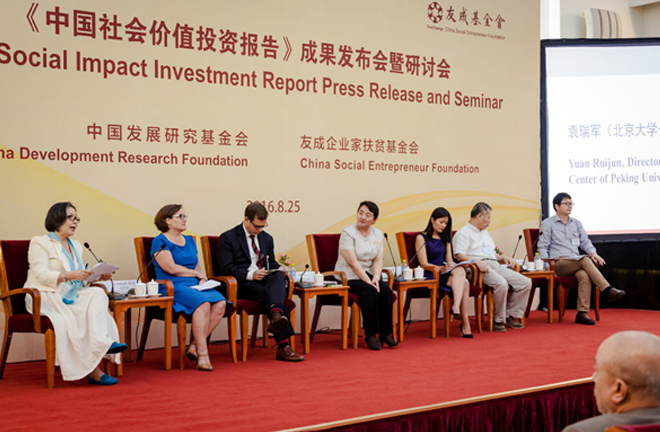Report leads to bullish views on social impact investment

The China Social Impact Investment Report was issued jointly by the China Development Research Foundation and the China Social Entrepreneur Foundation on Aug. 25 in Beijing.
Commenting on a report about social impact investment in China, scholars expressed optimism about the concept’s potential to guide the nation toward a more sustainable future.
Released on Aug. 25 in Beijing, the China Social Impact Investment Report was issued jointly by the China Development Research Foundation and the China Social Entrepreneur Foundation. It is the first of its kind to systematically elaborate on the status quo, challenges and future development of the market in China. Scholars in attendance at the release of the report said that it marks a significant milestone in the development of Chinese social impact investment.
The term “social impact investment” was introduced in a 2010 report published by J. P. Morgan in collaboration with the Rockefeller Foundation. It is defined as investment that is intended to “create positive social or environmental impact beyond financial return.”
China is promising to lead the development of global social impact investment, said William Beloe, senior operations officer at the International Finance Corporation, adding that the government should formulate an effective investment framework to guide the private sector and encourage engagement.
Beloe said that business feasibility, a good environment and measurable impact are the three preconditions for a successful and replicable social impact investment.
Lu Mai, secretary-general of the China Development Research Foundation, pointed out that China will remain in the stage of transition during the 13th Five-Year period (2016-2020). Social impact investment can lend capital and resource support to structural issues, meeting huge social demands in targeted poverty alleviation, affordable housing, public health care and population aging, he said, noting that China is in desperate need of social impact investments.
Lu’s view was echoed by Tamas Hajba, senior advisor for China at the Organization for Economic Cooperation and Development. China’s huge demand for impact investment, its ongoing projects, courses and lectures, as well as increasingly close international academic exchanges and cooperation in the field, indicate there is broad development space, Hajba said.
However, social impact investment carries with it a number of problems that were illustrated in the report. For one, it involves a diverse group of participants, and there is imbalance among them. Also, it lacks a complete industrial chain, explicit value investment framework, and sufficient investment and financing instruments.
The report suggests popularizing the concept by building alliances to improve infrastructure and catalyze research. It also advocates responsible consumption and procurement, recommending that corporations and the government incorporate the concept of impact investment into the reform of State-owned enterprises and public institutions.
David Galipeau, global chief of the UN Social Impact Fund, said the two major challenges China faces today are: inadequate understanding of investment theory and the difficulty of measuring social values. The international community should promote knowledge sharing and cooperative research on this field in a targeted fashion, he added.
Zhao Yuan is a reporter at the Chinese Social Sciences Today.
